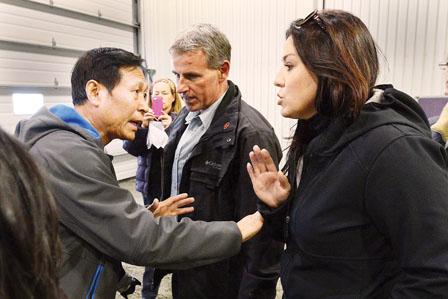空手一方客
收获了一种恬静的生活, 像一条波澜不惊的小河, 流过春夏 流过秋冬现在,加拿大总理新闻办公室和中国环球时报驻加记者之间的“争拗”仍在继续。为什么会发展到这一步,总理新闻办至于这般千方百计地阻挠李来提问吗?问题就是:李学江的问题戳到了哈帕保守党的痛处,因为他们根本不敢再批准任何一个大的投资案给中国的任何企业。所以他的新闻办只好不择手段,连西方号称的“公开公正”的假面具都不要了,再丑恶无理,也要阻拦李的发言。
如此目的,只能让事情的发展适得其反。现在人人都知道了,哈巴的开发大西北只是走走秀,喊口号,拉拉民意而已,他根本就没有能力去开发。本来,他也没想去开发。
什么叫弄巧成拙,这就叫。什么叫虚伪,这就叫。如果你不相信天下的政府都一样,在很多大的问题上都是一手遮天,欲盖弥彰,瞒天过海,只能说,那是你还没真正地领教过。
先来回放事件:
8月23日。哈巴每年夏天到北极转一圈。当天到最后一站:魁北克省的最西北的小镇Raglan Mine。按通常惯例,最后一站,总理之行要给随行的18个记者(和总理坐的都是同一架飞机)开个记者会,一般容许5+1发问。5个给(合法的,即批准的)随行的5个媒体,1个给当地的媒体。
这一次当地没有媒体参加,决定6个问题都给随行的媒体。随行的记者们,集中了6个问题和6个提问人名字,交给了了新闻办。其中就有环球时报的记者李学江。接着,总理新闻办说,只可以提5个问题。新闻办的秘书Julie Vaux去跟排在提问者队伍里倒数第二的李学江交涉,希望他不要提问题。因此发生了媒体说的推搡。
记者获准提问又被拒
哈珀总理此次北极之行,随团随机的记者共18人,其中只有两位外国记者,就是《人民日报》驻加首席记者李学江(以环球时报的名义出席这次),和新华社驻渥太华首席记者张大成。
在为期6天的行程中,哈珀每到一处,除视察外,都会发表一篇政策演讲,然后是记者提问时间,但没有一次给中国记者提问。
最后一天中午到达魁北克省最北部的拉格兰镍矿,在哈珀即将发表讲话前,随行记者团讨论提问的事。李学江说,总理一路上强调开发北极资源,但一直没讲钱从何来;是否请哈珀总理澄清一下政府对外国国有企业投资的政策与法规。记者们都说这个问题很好,很重要,于是将李学江的问题纳入到了提问名单,将总共6个问题及提问人名字提交给总理办主持提问的新闻室副主任Stephen Lecce。
刚有两个记者完,第三个记者提问之前,总理办秘书Julie Vaux来到排在提问队伍里的李学江旁边,把他拉出提问记者队伍之外,给他说:希望你放弃提问。该问题可由一加拿大记者代为提出。李学江质问她:为什么?这是一个中国视角的问题,换他人来问对中国记者不公平。因此李表示不同意。
到了第三个人提问完,Julie再次来到排着队的李学江旁边,拉着他的胳膊将他拉出队外。为此,李非常生气,便将她拉自己的手推开,这就是当地媒体报道的所谓“发生了推拉场面”。
这时,李学江以为该轮到自已提问了,就在抓起话筒,准备提问时,Julie示意举话筒的人把话筒从李的手中抽走,并来了两位皇家骑警,将李学江拉扯到会场后方。
总理办要求记者道歉
事后,李学江首先对发生这样的事件表示遗憾;同时向同行们表示,希望他们不必报道这个插曲,淡化此事。
但旋即有记者发现,当天23日1:09PM,总理办新闻室主任Andrew MacDougall从渥太华通过推特就此事发布了声明。声明说:“不论是否同意活动的安排与运作方式,对李先生来说,没有借口同总理办的工作人员发生肢体接触(get physical with); 李先生应该立即道歉。” “We’ll be raising the matter with the Press Gallery, and Mr. Li should apologize immediately,” the PMO’s communications director, Andrew MacDougall, tweeted later. “Agree or disagree with how things are run, there was no excuse for Mr. Li to get physical with our staff.”
对此,李学江认为,应该道歉的是总理新闻办。加拿大是一个民主国家,无任何理由突然剥夺一个记者提问的权利。这是对中国记者的歧视与不公。李学江当日夜里回到家中脱衣时发现,左上臂因被皇家骑警拽扯用力过大而出现数处淤青伤痕,李学江对此保留控诉权利。
李学江要求总理办道歉
事后,李学江在接受记者采访时表示,他认为自己是按有关规定加入到提问记者名单中的,总理办新闻室突然在现场作出撤换改变,未经记者团和他本人的同意,也未给出任何理由,这只能解释为是对中国记者的排挤与歧视。
他指出,在西方国家,记者具有无可置疑的提问权利,总理或总统也有装做听不见不予理睬,或是回避问题,或是顾左右而言它的权利。但无论是总理新闻室,还是警察都没有因为记者要提问而动用武力将记者押离的权利。他还指出,不在现场,远在数千公里之外的总理办新闻室主任,在没有任何调查的情况下,即匆匆发贴对李学江进行指责并要求道歉,显然是极不负责任的。
加国华人媒体为此采访当事人:
8月29日,加拿大华文媒体记者就此采访事件当事人,双方均表示坚持要对方道歉,目前仍处于僵持状态,下周或有进一步行动。
电话联系到渥太华的李学江时,他表示自己目前工作很繁忙,冲突事件没有影响他的正常采访工作,但下周可能会采取进一步行动,向国会记者团(The Parliamentary Press Gallery)正式发信,要求总理办向他道歉。
而总理办新闻室主任麦克杜格尔(Andrew MacDougall)对华文媒体说,总理办在推特上要求李学江道歉的立场没有改变,在李没有道歉之前,他拒绝任何评论。
总理办公室官员与中国《环球时报》(Global Times)记者因采访发生纠葛,双方在电子邮件中继续争拗。总理办官员要求中国记者道歉,否则禁止他参加总理出席的活动,对方则称,总理办需要先向他道歉才对。
《环球时报》报道,8月23日《环球时报》特派记者李学江在加国总理哈珀赴北极地区视察时,因为总理办新闻官毫无理由地临时要求中国记者放弃提问,随后还叫来皇家骑警,将记者强行拉离提问队列,导致李学江与总理办新闻秘书朱莉发生「推拉事件」。
通讯总监发电邮要李公开道歉
然而这一事件尚未就此结束,总理办通讯总监麦克杜格尔(Andrew MacDougall)仍然在给李学江的邮件中要求记者公开道歉。李学江对此予以坚决驳斥,双方在邮件中再次展开交锋。
8月27日晚,麦克杜格尔发电邮给李学江称,「如果你不推我的工作人员并试图夺走麦克风,这件事就不会发生。我等待你的道歉。」
当晚,李学江回覆道:首先是你的同事走近并拉扯本人,要求本人放弃提问,记者这才用手推挡她的拉扯的。记者当时正站在提问记者队列里准备提问,怎么会毫无理由地走出去「推拉」她呢?
李学江在电邮中写道:「我是被记者团集体推选出来的提问记者之一,你的同事没有剥夺我提问的权利,尤其是强行!你的同事首先欠我一个道歉。」
加新社和加拿大广播公司的报道都显示,就在提问顺序快要轮到李学江时,新闻秘书朱莉却两次前来拉李学江出队,未作任何说明,就要求中国记者放弃提问,还曾建议将提问权让给加方记者。李学江没有同意,当她再度拉扯李学江出列时,李学江才将她「推开」。

李强调没「推开」女新闻秘书
李学江在给麦克杜格尔的电邮中指出,「我想,你在发出指摘我的信件之前,根本没有也没有时间核实事实,因为当时记者都在发稿室采访本人」,「我并没有『推』过朱莉女士,我只是想把她抓?我的手推开。你找不到任何我推朱莉女士的理由,当时我正在准备提出我的问题,你说我这个时候去推朱莉女士是完全不符合逻辑的。」如果你不清楚事件发生的过程,「现场有一位女士见证了整个事件。她的名字叫珍妮丝·考利」。
这名女士写道,「我看到这个男人在排队等候,然后一名女子走来同他说了些什么,她试图推走他,然后他就回推了,你们能看到他在问『为什么』,然后就推拉起来。那名女子是肇事者。总理和加拿大人都应该向中国记者道歉,因为这将我们加拿大的民主变成了伪善。」这段评论是加拿大广播公司(CBC)8月23日题为《在哈珀活动上扭拉之后,加拿大皇家骑警制止中国记者》文章后面的跟帖。
李学江告诉麦克杜格尔,「记者对总理北方之行发回的4篇报道和1篇评论,加上19张照片都是正面报道,并不负面也不吹毛求疵。它们都有助于提升加拿大在中国的良好形象和声誉。而这正是你作为总理办公室官员的份内职责所在」。
针对麦克杜格尔说他与其他记者了解了情况的电邮,李学江指出:那为什么他们都不站在你这一边呢?正相反,他们的报道都批评了总理办公室限制及不尊重媒体及记者。
李学江质问道:难道你没有读《环球邮报》和《国家邮报》第二天的新闻报道吗?难道你没有看当晚加拿大广播公司与加拿大电视台的新闻吗?难道你没有看到在这些报道后面的数以千计的读者们的跟帖评论吗?」
李问是否代表总理 麦随即收声
麦克杜格尔在最后的电邮中称:「如果你不作出道歉,在总理的活动中你不受欢迎。」
李学江则在电邮中质疑麦克杜格尔这个表态是否能够代表加国总理,如果真的能够,要求麦克杜格尔以总理的名义向公众,以及向中国驻加拿大大使馆,尤其是要向议会记者中心发一个公告。
麦克杜格尔对此不再作声,只是说:「直到你发布公开道歉声明,我不会再回覆你的任何通信。」
李学江在电邮中说:别指望我会道歉;我只要求你回答一个极简单的问题:临时剥夺一位中国记者的提问权利的真实原因到底是什么?因为这是发生此次不愉快事件的最根本的起因。但麦克杜格尔对此始终避而不答,拒绝回答为什么不许随行的中国记者提问的原因。
加国本土主要媒体几乎都站在李学江一边
加拿大《国家邮报》认为总理办公室的这一举动「并非意外」,因为此类官方与媒体的冲突在加拿大国内已司空见惯,意外之处是,「这种事件落在国际媒体头上尚属首次」。
总理记者会上发生的这一冲突事件成为加主流媒体关注的新闻。事发第二日,加拿大全国最大的报纸《环球邮报》(Globe and Mail)在其第四版最上方刊出了两位加皇家骑警拉扯中国记者李学江的巨幅彩色图片,并在其下面配发了约2000字的相关报道。另一全国性大报《全国邮报》(National Post)同样在其第四版刊出了约2000字的相关报道,下面配发了同一幅黑白照片。加拿大两大全国性电视台CBC和CTV,都在事发当晚将此事作为重要新闻事件播出。
这一事件在加拿大也引起了民众的广泛关注。有加民众在网上留言,表示声援中国记者,认为该道歉的应该是总理总理办。一位名为“Ken Tone”的网友说:“哇!你们真会瞎说,哈珀拒绝回答问题,而你却让记者道歉。你们疯了吧。”
最重要的是一位现场女听众的证词:有一位名叫Janice Cowley的现场女听众站了出来作证,她写道:“我看到的可不是这样(指新闻室对李的指控)。我看到那个人(李)排在(记者)队里,这时一位女人过来对他说了些什么,并且试图推他走开,所以他才回推了她。我可以听到他在问‘为什么’,于是才发生了推拉。她才是肇事者。总理应该向李道歉,然后是向全体加拿大人(道歉),因为这将我们的民主变成了伪善。李说得好‘总理新闻室不应剥夺我(提问)的权利,这不是民主’。”
有媒体披露说,总理办对媒体素来态度傲慢,无论是加通社、《环球邮报》还是《全国邮报》,都在报道中提到总理新闻室对记者的不尊重。《环球邮报》在报道中写道,“自保守党当选以来,加拿大媒体同总理办人员的关系紧张已经司空见惯。”
相关链接:李学江简历
李学江,吉林省榆树市人,为人民日报社高级编辑,曾任人民日报驻美国首席记者。李学江先是在中国人民解放军海军北海舰队服役;后毕业于中国社会科学院研究生院新闻系和英国布拉德福德大学和平研究系。1995年至2002年李学江任人民日报驻澳大利亚首席记者;2002年至2005年在人民日报国际部从事国际评论工作;2005年8月出任人民日报驻华盛顿记者站首席记者,其后出任驻渥太华记者站主任兼首席记者。他的另一个身份是人民日报社旗下《环球时报》的加拿大特派记者。
“推拉事件”现场视频:
http://globalnews.ca/news/798660/harpers-northern-tour-ends-in-tussle-with-chinese-reporter/
加拿大CBC电视台的报道 (08-23-2013):
Canadian media offered up slot
As is now common practice at Harper news conferences, the number of questions is decided by the prime minister’s staff and announced to members of the media, who determine by consensus which issues need to be addressed and which reporters are best to pose them.
Political reporters have long complained about the practice, but Harper’s office for years has refused to do things any other way.
On this trip, the prime minister’s deputy director of communications, Stephen Lecce, changed the established practice and instead alternated which reporters he would call upon — one group the first day, the remainder the next.
The two Chinese-language reporters on the trip did not ask for questions until Friday.
In advance of Harper’s news conference at Raglan Mine, reporters were told they would get either four or five questions in English. On this trip, the fifth question has gone to a reporter from the local media. There were also one question reserved for French-language media
In the absence of a local reporter, reporters agreed the fifth question in English should go to Li. He wanted to ask about foreign investment in Canada's natural resources sector. But Lecce said in the absence of a local reporter there would be only four questions allocated, though he offered to see if a fifth would be allowed.
Among themselves, the travelling media agreed Li should have a chance to quiz the prime minister on a topic that mattered to his readers and would provide the rest of the reporters with potentially useful material.
“I wanted to clarify the federal government policy and the regulations toward foreign state-owned company investment,” Li said later.
The other media members offered to dump one of their questions so Li could ask his. At first it seemed that plan would be acceptable. In fact, Li said Lecce asked him his name in order to add it to his list.
In the end, Lecce stuck to four questions in the alternating format and refused to allow Li to occupy a slot voluntarily vacated by a Canadian reporter.
最重要的是,当地在场的听众Janice Cowley的证词:






"A dictator is a ruler who does not rule through democratic means.
In modern usage, the term "dictator" is generally used to describe a leader who holds and/or abuses an extraordinary amount of personal power, especially the power to make laws without effective restraint by a legislative assembly[citation needed]. Dictatorships are often characterized by some of the following traits: suspension of elections and of civil liberties; proclamation of a state of emergency; rule by decree; repression of political opponents without abiding by rule of law procedures" Sounds about right, how did we get to This? Harper need to Go! “